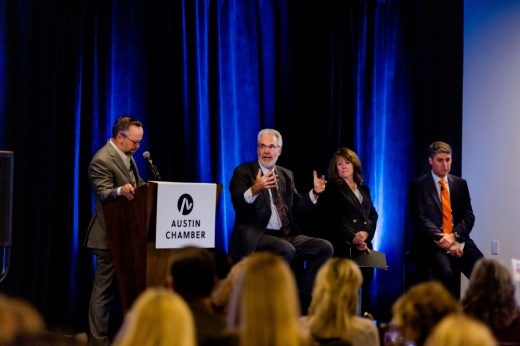Speakers for the panel discussion included Charisse Bodisch, senior vice president for economic development for the Austin chamber; real estate economist Mark Dotzour; and Thomas Schuette, senior vice president and investment grade credit research analyst for PIMCO.
Responses have been edited for length, style and clarity.
Schuette, one of the things you study is the health of local municipalities and local government entities. Do you mind sharing how healthy the balance sheets are of the local municipal entities and the different groups you study?
Schuette: States and locals nationwide, earlier in the pandemic, started making cuts and were very worried about what was happening. Then, they were amazed at the inflows of tax revenue beyond the money they got from the federal government. So, a lot of states and locals get to tell the same story of rainy day funds well beyond what they had expected. I think as we enter this period of uncertainty right now, one of the real strengths is the state and a lot of local governments around here are sitting on a lot of dry powder, whether it's infrastructure spending or replacing revenues if they do start to see tax collections slide. Austin, Leander, Cedar Park, a lot of these cities are sitting on somewhere between 30%-50% reserve levels, which means they can see 30%-50% of their revenues fall away, not make any expenditure cuts and still provide the same level of service. So that's really impressive and thinking about how state and local governments are in a position for this period where you don't know how things are going to perform.
Let's dig a little deeper into that on the infrastructure side. So you're talking about these city governments that have a lot of cash; they're ready if there is a dip or a recession; they're ready for that based on their balance sheets. They also have borrowing capacity. But this is all before you were even talking about any of the infrastructure money coming from the federal government. Isn't that right?
Schuette: That's right. When you look across the region, a lot of local governments here and the state as well have borrowed a decent amount of money in past years, but it's really been kept in pace with population growth, tax base growth and all the other metrics you look at. I was looking at data before I came in today, and through midyear debt instruments from Texas, and that’s state and locals, according to the Bond Buyer, was actually down 7% year over year. So I think what you're seeing is a lot of cash that's in here [is being used] for pay-as-you-go financing and borrowing, which leaves you capacity if you do need to issue debt in coming years. What we're hearing is that it's not really flowing through yet, and this might be a 10- to 12-year process of the money actually getting put to work. So, again, you've got really good rainy day funds, a solid turn of revenue collections, and you're about to get a big slug of money from the infrastructure bill that you've got time to make wise decisions on.
I think a big part of what we need to see as an economy, for the diversity of a growing economy, is more jobs. Charisse, you've been doing this a long time, and you're probably one of the best people in the room to talk about economic development. What are you seeing right now? What are you seeing right now that may be different from what you saw last year in economic development for the region?
Bodisch: For us to be in Texas and for us to be in the Austin region, we are the fortunate ones. I can tell you that right now. Army Futures Command, that was a once-in-a-lifetime deal for us to be able to recruit them. Apple’s big expansion, it's a big office expansion outside of their corporate headquarters [and is] a once-in-a-lifetime deal. Tesla [was] a once-in-a-lifetime deal during COVID. That deal was done virtually, for the most part, during COVID-19. Samsung, once in a lifetime, and thank you to the comptroller for all the work on that. We've had multiple once-in-a-lifetime [opportunities] in this region. The deals we're seeing now are in the millions. They are mega deals, they are in the billions of dollars worth of capital investment. It is amazing. The flow of projects that we are currently working on, those once-in-a-lifetime deals, have actually set the platform for the diversity that we're experiencing. So when you look at Army Futures, and you look at Samsung, and you look at Tesla, there's a lot of supply chain associated with that. And that's actually what's going to help us, whether it's recession, downturn or a little blip, whatever we want to call it. We did good in 2008; we were one of the last ones in and first ones out, and because of what [people] in this room have done and the diversification that we've put into place, I think that's going to help us.
I've talked to a lot of builders and developers here in Austin, and they are seeing a slowdown, a significant slowdown. I've heard numbers [as much as] 50% less [work for builders and developers.] And so one question I have for you Dr. Dotzour, the federal government is doing this interest rate that feels punitive to the real estate community. How does that flow to slowing down demand elsewhere?
Dotzour: So the question is, is it punitive to real estate? The answer is yes, by definition. Anybody in the real estate business knows that you're the first one [to be affected.] I speak to real estate audiences every week, and the real estate industry is the first one to feel it. They are the point [man.] They're the most interest-sensitive industry in the country. So, the good news is, if you're in the real estate industry, you're the first one to go down, but you're also the first one to come back. Right now, they're feeling the burden a lot, but they're not laying off a whole bunch of people yet either; it's just that in normal circumstances, commercial and residential real estate are the first ones to feel it.
Charisse, what are you hearing from local business owners looking to move here that are thinking about bringing jobs here? What does the real estate environment look like for them? Or are there other factors that these companies are telling you that they're concerned about?
Bodisch: The top things that every company will work with, at least up to this point, and some of this might change over the next couple of months, is talent, tightness of talent and getting talent. I think we're going to have some talent available based on some of the most recent news. But the other thing is affordability, and that is caused by a lot of things. It's not just real estate, and it's not just supply chain costs. It's not just the labor costs. Interest [rates] have got to be carried, and all of that gets folded into every project. September [data from the Austin Board of Realtors] shows that we're at a median of $470,000 average price for a home in the Austin region. For the first time, we're seeing houses on the market for about 45 days. Now you’ve got interest rates. Are people going to be paying a higher interest rate to go buy that home? How does that affect our multifamily? I think some of this is going to play into how we can address our companies moving in. We've got more housing stock, more on the market. That's going to start depressing some of that pricing. On the talent side, you've got some companies that are announcing layoffs, so there may be some talent availability that we can put into those new companies.
Thomas, we can talk about the education funding issues that you're seeing. We're writing a lot about local districts having funding shortfalls. So [if you could] talk to us about some of the concerns about education funding as we [move into] these next few years.
Schuette: So it's not purely a Texas issue, but [as] state coffers have filled, you've had the well-publicized teacher shortage and high burnout within K-12. One of the things we've really seen within public-sector data is that wage growth has really lagged [behind] the private sector. I think, only within the last quarter, we started seeing public-sector wage growth outpace the private sector. The public sector has really lagged in being able to go back to prepandemic employment levels. Now the state coffers are full, there's going to be some really tough decisions on school funding formulas. In Texas especially, you have so many suburban districts that are growing so fast, and we saw the bond referendums [in the recent election] throughout the state and the size of them. A lot of it is representative of growth. Texas has some interesting issues facing it with the permanent school fund. We’re getting close to hitting a ceiling, and that's been an amazing mechanism for school districts in the state to borrow at exceptionally low interest rates. So I think you're going to have tough capital decisions, tough funding decisions.
Dr. Dotzour, what advice would you give business owners about how to manage their balance sheets right now with the uncertainty in the next few years?
Dotzour: Well, I think that you're entering into a slowing period. Just careful not to get too much leverage on your books. It's not a good time to have a whole lot of debt. Most businesses have debt, but there's high levels of debt, and there's lower levels of debt. So I think it's a prudent thing to do, whether it's a business or if you own a bunch of real estate, it's good to not go into a recession with a lot of debt. You just have to plan for lower revenue—in a real estate context, [possibly] lower rent per unit and possibly more vacancy. So you just have to be careful to keep your debt levels low enough that you can take a lower rent and a higher vacancy and not lose your property. The same thing with a business; just be prepared for lower revenue and higher costs. And keep your debt at a moderate level.





